The Head of Fujitsu Research Talks about the Future of Generative AI
Article|2023-09-21
7 minute read
Technology has evolved at an overwhelming rate in recent years. Especially in the past year, the evolution of generative AI has become a hot topic, including ChatGPT, which leverages large language models (LLMs). Not a day goes by that we don't hear about generative AI, such as ChatGPT, Dall-E2, and Stable Diffusion, which generate images.
Currently, companies are actively considering the use of generative AI, and it is expected to produce significant results in improving operational efficiency and productivity at a wide range of levels, from the individual business level to the organizational and management levels. The use of these exploding technologies will be key to the competitiveness and sustainability of future companies. At the same time, many companies are struggling with how to implement such advanced technologies.
Seishi Okamoto, Executive Vice President of Fujitsu, who leads Fujitsu Research, told us about some of the ways in which companies are working with generative AI.
Business Scenarios and Challenges of Generative AI
"Fujitsu conducted a survey on the business use of generative AI based on customer feedback from various industries. As per the survey, the business scenario of generative AI can be classified into three categories based on the required data range, and we have also found that customers expect a wide range of use cases," says Okamoto.
The first case is to improve the efficiency of individual operations by utilizing internal information within a limited scope of work. For example, it can be applied to various tasks such as generating feedback to customers in customer support with natural sentences, automatically generating ad designs with simple ideas, automatically generating documents for loan and contract reviews, and automatically generating code for software development.
The second case is "automation of organizational operations" using a wider range of internal and competitor information. There are a variety of business scenarios such as increased productivity and automation in marketing, budgeting and staffing planning, effective marketing schedules, documentation and content generation in new product/service planning, store opening planning, production and procurement planning.
The third case is "management support," which utilizes an even wider range of internal and market information. "We believe that we will be able to support the development of operational stories, faster documentation, and greater efficiency in business operations such as management strategy, business model generation, medium- and long-term planning, portfolio optimization, and investment and M&A," he says.
On the other hand, there are significant challenges to the business use of generative AI. He lists three issues that he thinks are particularly important.
"First of all, it is not clear how to apply it and how to operate it in actual business. For example, a construction client told us that they are unsure of the best ways to improve the accuracy of their answers, such as changing the external information and prompts provided."
"The second is the problem of computational resources. A retail customer complained that the computational resources required for generative AI are hard to understand and the cost is unclear."
"The third issue is information security and privacy. A real estate customer says that it is too early to use it because it is unclear whether the sales team working closely with customers can determine copyright violations and accuracy."
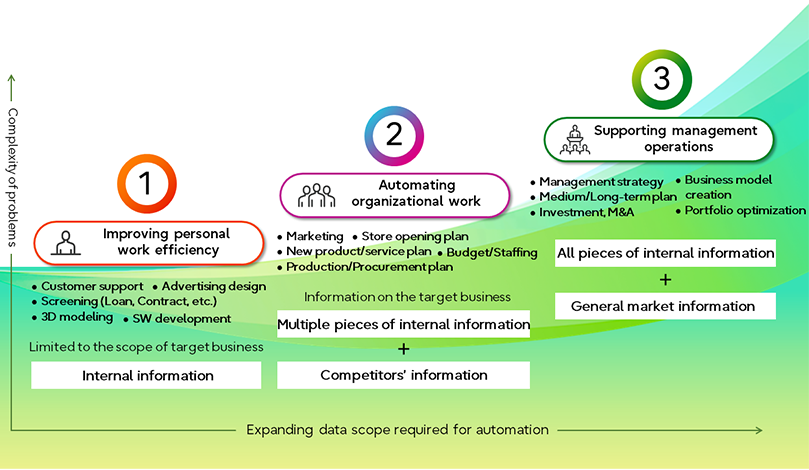
Fujitsu Kozuchi Boosts AI Capabilities
In order to solve the first problem, which is developing concrete business use cases of generative AI, Fujitsu is deploying Fujitsu Kozuchi, an AI platform that enables customers to quickly test out cutting-edge technologies. Together with other companies' intellectual property, Kozuchi provides components from a value-of-use perspective and is used globally by customers, consultants, partners, ventures, universities, and other research institutions.
Generative AI is also installed in Kozuchi, and the technology to solve the problem mentioned earlier has been already implemented in Kozuchi, so customers can use it already. Fujitsu has developed a business-specific generative AI that can use generative AI to suit our customers' business, providing a dedicated environment on top of Microsoft Azure. In addition to Azure OpenAI Service, we have also used LangChain, which is effective for service development using large language models, to enable ChatGPT without logging customer data.
As for the specific use of generative AI in business, we are working on various initiatives with our customers, such as supporting design document review to identify problems in design documents in system development, effective customer service to learn customer characteristics of brick-and-mortar stores and automatically customize content on signage, and improving the efficiency of drug discovery screening by protein structure estimation.
In addition, Ridgelinez, a DX consulting firm from Fujitsu, has started providing generative AI consulting services to support enterprise adoption of generative AI.
"Going forward, we will continue to provide Fujitsu with specialized models that are fine-tuned for each industry and business, as well as unique technologies that reduce the weight of LLM depending on the phase of use. By providing customers with a wide range of options, we will strongly support value creation through generative AI," he says.
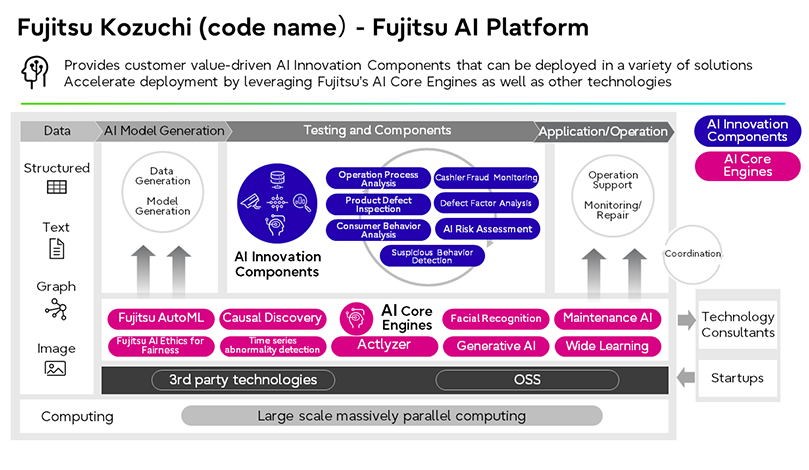
10^23 FLOPS Wall in AI Learning
Okamoto is an AI expert with a Ph.D. in AI. He previously served as the Head of the Artificial Intelligence Laboratory, then as a Fellow of the Fujitsu Research, and has been Head of Fujitsu Research since April 2023.The second issue he is particularly concerned about regarding using generative AI in business is computational resources.
"Generative AI development requires significant computational resources. In research on learning language models, it has been reported that the so-called emergent property of suddenly being able to do something that has not been possible before is observed when the computational performance of 10^23 FLOPS is reached. (*1)"
"However, the computational performance of 10^23 FLOPS is not achievable even when using the AI Bridging Cloud Infrastructure, which has 4,000 GPUs and is currently the largest GPU supercomputer in Japan. In other words, only a small percentage of companies with very large computing resources are ahead in LLMs," he says.
This means that some companies may monopolize AI technology, and others may make a big difference by trying to differentiate their businesses with AI.
Also, ChatGPT and others LLMs learn from content on the Internet, but there are reports that only 3% of content is in Japanese, so implementation of Japanese-specific content has been delayed.
Fujitsu, which understands the importance of democratizing AI, is working with Tokyo Tech, Tohoku University, and RIKEN to develop a computational environment for generative AI using Fugaku. The research results will be widely published on Hugging Face and GitHub so that they can be widely used by academia and companies, which will contribute to the improvement of AI research and utilization in Japan and the world.
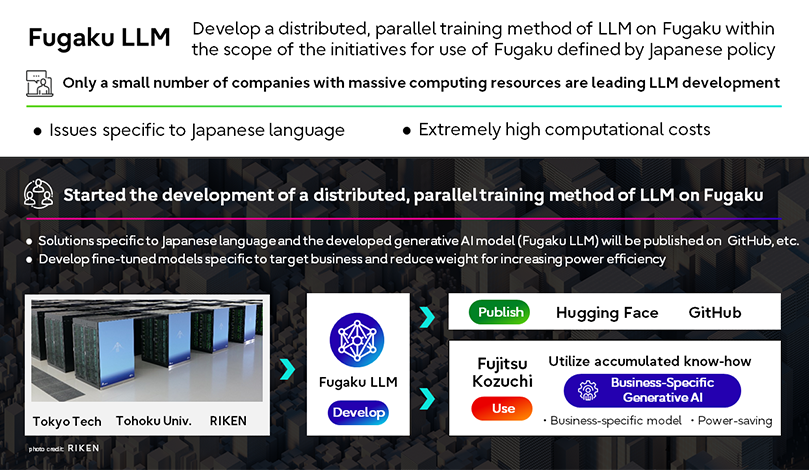
The Importance of Converging AI and Computing
"Not only generative AI, but also AI and computing are converging to create innovation," Okamoto continues. "For example, in the field of materials, quantum chemical calculations for automotive fuel cell electrocatalysts, which can take several months with thousands of CPUs, can be calculated in 0.1 seconds. In the field of drug discovery, conformational analysis of proteins, which can take more than one year, can be predicted in one hour with high accuracy comparable to experimental levels."
In the field of materials, we have also achieved significant results in the synthesis of ammonia, one of the next-generation energy sources that is attracting attention as a carbon-free material. Iron is used as the main catalyst for ammonia, and CO2 emissions during the ammonia production process are a major issue.
"We are teaming up with the Icelandic venture company Atomonia to explore a new catalyst for ammonia that hasn't made much progress in over 100 years. The convergence of Fujitsu's proprietary AI technology of computing and causal discovery has led to new discoveries so that elements with low group numbers are effective in new catalysts," he emphasizes.
- Fujitsu and Tokyo Medical and Dental University leverage world's fastest supercomputer and AI technology for scientific discovery to shed light on drug resistance in cancer treatment
- Fujitsu and Atmonia succeed in development of new technology that accelerates search for disruptive catalyst for enabling sustainable ammonia production
Ethics, Information Security, and Privacy Issues Required for AI Use
"Finally, I would like to introduce our approach to the third issue: the information security, privacy and ethical aspects of AI. Fujitsu is advancing research and development into secure and trusted generative AI technologies that integrate AI ethics, AI quality, and AI security," he says.
"For example, we are conducting R&D on generative AI governance technologies such as harshening countermeasures and enhancing ethical aspects using fine tuning, generative AI anti-attack technologies such as prompt injection and poisoning, and technologies to maintain the reliability of data itself. In this context, harshening refers to the fact that generative AI plausibly outputs lies, prompt injection refers to a method that uses a special question to cause unexpected behavior such as withdrawing sensitive information, and poisoning refers to a method that causes AI to learn incorrect values. These are serious problems in the enterprise use of generative AI."
"In the field of AI cybersecurity, we are collaborating with Ben Gurion University, the world's most advanced research institute, and are conducting work centered on a research center established in Israel. In addition, in order for generative AI to become secure and reliable, it is important not only to develop the technology but also to spread it widely through demonstration. Fujitsu is a founding member of AI4People, Europe's largest international forum for AI ethics, and has been active since its inception in 2018. " he says emphatically. He now serves as co-chair of the Scientific Committee and actively discloses our company's research results and makes technical contributions to policy recommendations.
On June 14 of this year, the EU AI Regulation Bill was adopted. Leveraging its presence in AI4People, Fujitsu will demonstrate secure and trusted generative AI technology that complies with EU AI regulatory laws in the European regulatory sandbox and deploy it not only in European countries, but also rapidly beyond Europe.
Compliance with EU AI regulatory laws is a must for European businesses. In addition, as similar regulations are being adopted globally, Fujitsu hopes to support customers around the world by equipping Kozuchi with secure and trusted generative AI technology, based on its experience in Europe.
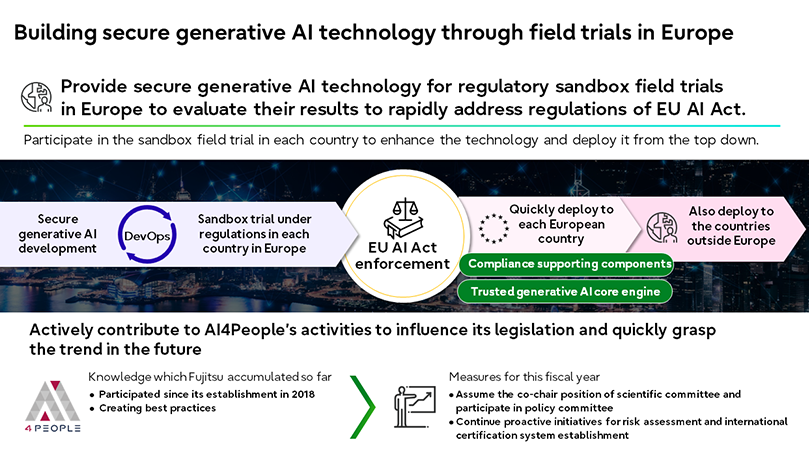
Initiatives and Prospects for Fujitsu's Advanced Technologies
In 2020, Fujitsu established the purpose "Make the world more sustainable by building trust in society through innovation." In order to realize this purpose, we launched Fujitsu Uvance, a business model to promote market creation and adding value value-addition based on social issues. To support this, Fujitsu focuses its resources on five technical areas: computing, networking, AI, data and security, and converging technologies.
Fujitsu Research is currently engaged in cutting-edge research and development in these 5 technological fields with a team of 920 people from 8 countries. With AI in India and security in Israel, we are pursuing distinctive research that takes advantage of local interests, and we plan to dramatically increase the number of researchers based overseas.
We are also actively working to improve speed and competitiveness through open innovation. In particular, the Fujitsu Small Research Lab, which has established research centers within universities in and outside Japan and has been engaged in industry-academia collaboration activities with our company researchers residing or staying for long periods of time, is now in its second year, and its activities are getting into full swing. By selecting the world's most advanced universities and teachers in their fields and working closely together with them, we are able to rapidly produce powerful research results.
Finally, Okamoto concluded with his objective, "Working together with our customers to co-exist with technology to reduce risk and accelerate innovation to achieve Fujitsu's purpose."

Profile
Seishi Okamoto
Corporate Executive Officer, EVP, Head of Fujitsu Research,Fujitsu Limited
In 1991, Seishi Okamoto joined Fujitsu Laboratories, Inc. He is engaged in research and development of artificial intelligence, including machine learning, reasoning, natural language processing, and knowledge retrieval. In 2011, he became engaged in the development of new big data businesses and the training of data scientists at Fujitsu Limited for three years. After serving as the head of Artificial Intelligence Research Center, the head of Artificial Intelligence Labs, and Fellow of Fujitsu Research, he held his current position since April 2023. He is also a visiting professor at Tokyo Medical and Dental University.
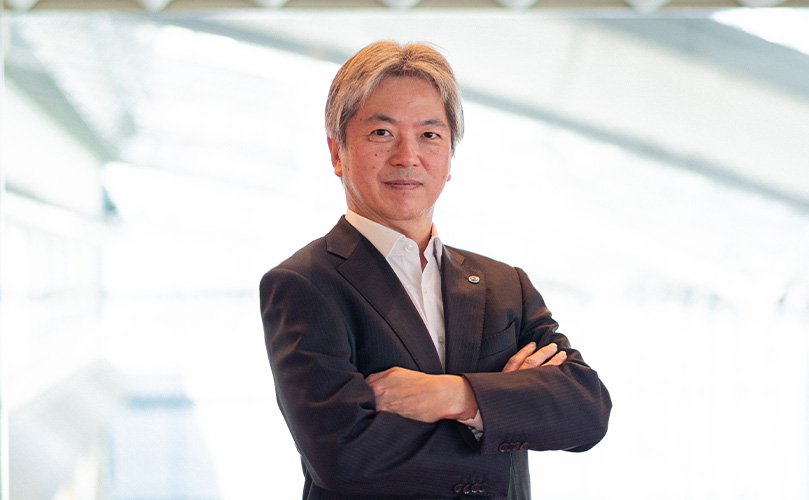
Information
Fujitsu Kozuchi (code name) Fujitsu AI Platform


How can AI transform our society? Fujitsu updates Kozuchi to accelerate the speed of AI adoption

